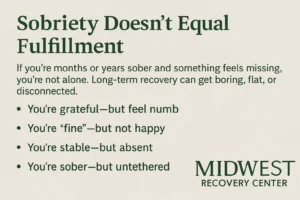You did what most people never do.
You stepped into treatment. You stayed. You built a life. You figured out how to live without using—through cravings, triggers, grief, and silence.
But now, you’re here. Months or years out. Sober on paper. Still going to work, still answering texts. Still “okay.”
And yet—somewhere underneath all that function—you feel flat.
Like something inside you hasn’t caught up. Like the lights are still technically on, but no one’s really home.
This isn’t relapse. It’s not denial. It’s the quiet, uncomfortable plateau where so many long-term alumni land. And at Midwest Recovery Center, we treat that stuckness seriously.
Because disconnection isn’t a dead end.
It’s the sign that it’s time for something deeper.
When Sobriety Isn’t Enough (And You’re Afraid to Say It Out Loud)
Let’s tell the truth that nobody wants to say in a meeting:
Sometimes, long-term recovery gets boring. Or numb. Or quietly unbearable.
Not because you’re ungrateful.
Not because you’re doing something wrong.
But because human beings were never meant to live in maintenance mode forever.
You did what early recovery asked of you—now your spirit is asking for something else. And it’s okay if you don’t know what that is yet.
That’s why we have PHP.
PHP for the Emotionally Sober but Spiritually Flat
You might think “Partial Hospitalization Program” sounds too intense. Too clinical. Something for people who are falling apart.
But PHP at Midwest Recovery isn’t just for crisis.
It’s for recalibration.
For the clients who say:
- “I’m fine. I just don’t feel connected to anything.”
- “I haven’t used, but I’m emotionally checked out.”
- “I can’t remember the last time I felt joy without faking it.”
You don’t need to be on the edge of relapse to get help. You don’t have to implode to justify a reset.
PHP meets you in that quiet middle—where it’s not about staying sober anymore, but about staying whole.

What PHP Looks Like for Long-Term Alumni
You’re not new to this.
You don’t need someone explaining what addiction is.
You need something that acknowledges where you actually are.
In our PHP for alumni, we tailor care to your depth—not your distress:
- Group therapy that moves beyond early-recovery clichés
- One-on-one sessions focused on stagnation, spiritual disconnection, emotional avoidance
- Real-life reflection on meaning, purpose, and identity post-recovery
- Support to explore what growth looks like beyond abstinence
You’ll be in a space where no one’s measuring your worth by how many days sober you are—but instead by your willingness to stay real.
You Don’t Need to Crash to Come Back
This is one of the most damaging myths in the recovery world:
That you only come back to treatment if you’re using again.
That asking for help while you’re “doing fine” makes you weak, ungrateful, or dramatic.
We call BS.
Many of our most powerful PHP clients are long-term alumni from Perrysburg, Maumee, and Oregon, Ohio—people who reached back out before things fell apart.
Because they knew what it felt like to white-knuckle their way through success.
And they were done pretending that was good enough.
Burnout Is Not a Badge
You might be the strong one. The mentor. The one who sponsors others, keeps the family steady, volunteers, shows up on time.
But who shows up for you?
Recovery burnout sneaks in quiet. It doesn’t look like chaos—it looks like numbness. Like default mode. Like going through the motions and forgetting who you are.
PHP isn’t about restarting your recovery. It’s about reclaiming your life from the version of yourself that only knows how to survive.
What If This Is Just a New Beginning?
That disconnected, emotionally gray version of you?
It’s not the end of the road. It’s a turning point.
Most of the alumni we work with describe PHP as a return to something they didn’t even know they’d lost:
- A sense of presence
- A renewed connection to joy or purpose
- The ability to feel again—not just function
- The courage to ask: What’s next?
PHP can be that bridge. Not back to the beginning—but forward, toward something richer.
What to Expect: PHP in Practice
When you join PHP at Midwest Recovery Center, here’s what your days will look like:
- Five days a week of focused, therapeutic structure
- Daily group sessions that go beyond basics and explore emotional depth, relationships, stuck points, and re-invention
- Individual therapy tailored to post-recovery complexity, not crisis response
- Medication management if needed—but never pushed
- Time to go home each evening and practice being in your real life, with support when it gets hard
We don’t just help you feel better.
We help you feel more—with intention, with context, and without apology.
FAQs: PHP for Long-Term Alumni
Do I have to relapse to be accepted into PHP?
Absolutely not. Many PHP participants are sober and stable—but feel emotionally stuck, burned out, or flat. That’s valid, and it deserves care.
Is PHP too much if I’m still working or taking care of family?
PHP typically runs during daytime hours, which may require schedule adjustments. That said, our team will work with you to explore options that fit your life. You’re not alone in balancing obligations.
I’m already in therapy. Can I still do PHP?
Yes. PHP can complement existing therapy. We’ll coordinate care with your therapist (with your consent) to make sure your experience is integrated—not fragmented.
Will I be grouped with people in early recovery?
Not necessarily. PHP groups are carefully structured, and we often create alumni-focused or mixed-experience sessions. You won’t be stuck repeating Step One unless that’s where you need to go.
How is PHP different than IOP?
PHP offers more hours per week and is often better suited for clients navigating deep emotional work or burnout. Think of it as a mental health intensive with structure and space to explore more complex layers.
Can I do PHP more than once?
Yes. Recovery isn’t linear, and support doesn’t have a one-time-use policy. Many alumni return to PHP when they need to recharge, reset, or re-ground.
If You’re Still Reading, You’re Already Reaching
Something inside you is stirring. It’s not about crisis—it’s about clarity.
You’re ready to stop faking fine.
You’re ready to feel again.
You’re ready to come back—not because you’re failing, but because you know there’s more.
And that next chapter? It starts here.
Call (888) 657-0858 or visit our Partial Hospitalization Program services in Toledo to learn more.
We’re here for alumni in Maumee, Perrysburg, Oregon, and throughout the greater Toledo area who are done pretending they’re fine—and ready to grow again.
Let’s start where you are. Let’s build what comes next.


























